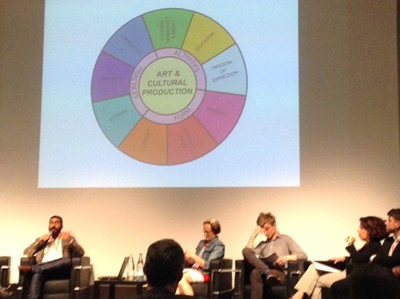( Session : the art of philanthropy: new paradigms for social change)
Too often it seems that discussions about art funding begin from a somewhat flawed premise; namely that there is a fundamental opposition between ‘art for art’s sake’ and ‘art for social change’.
 It would be useful to declare a moratorium on people proceeding in debate as if these two concepts were antithetical.
It would be useful to declare a moratorium on people proceeding in debate as if these two concepts were antithetical.
The phrase ‘art for art’s sake’ was coined very deliberately to denote cultural endeavour that did not exist to propagate the moral or political orthodoxy of the day. It is a term loaded with revolutionary intent.
It is synonymous with the desire for social change, not opposed to it.
I mention this having just left a session at the EFC conference enthused by the depth, subtlety and strength of the claims made for art; both as a transformative instrument of the self and as a lever of economic and cultural empowerment.
The autotelic vs pragmatic premise was dealt with swiftly, and the discussion that followed was all the better for it. It seems that once this false dichotomy is dispensed with, there is an important and wide-ranging debate to be had.
Amongst the many provocations offered by the panel, here are a few that I found particularly powerful:
- Funders should recognise that social justice cannot be meaningfully separated from economic and cultural justice. To be excluded from a system is to be denied a host of rights, including, but not limited to, the right to be heard and the means to tell and disseminate your story. Helping to redress this imbalance can have a catalysing effect, capable of creating change in citizens, communities and nations.
- The conflict in the Ukraine has seen a shift from ‘military industrial complex’ to ‘military aesthetic complex’. Funding the arts is the most powerful way of empowering people in their acts of resistance within this new paradigm.
- Assessment of art’s power to elicit social change should not shy away from considering intangible effects within a given citizen,examples may include; spiritual experience, self-actualisation, catharsis, the erotic and the epiphanic.
- Our desire to judge ‘impact’ cannot be separated from the wider agenda of economic positivism and its attendant neoliberal apparatus…. To create social change you must be willing to work outside the boundaries of the system you wish to influence.
- Funders could benefit from thinking more artistically; they are great at creating products but poor at ensuring they are activated within wider culture.
Keiran Goddard, head of communications, Association of Charitable Foundations






Comments (0)